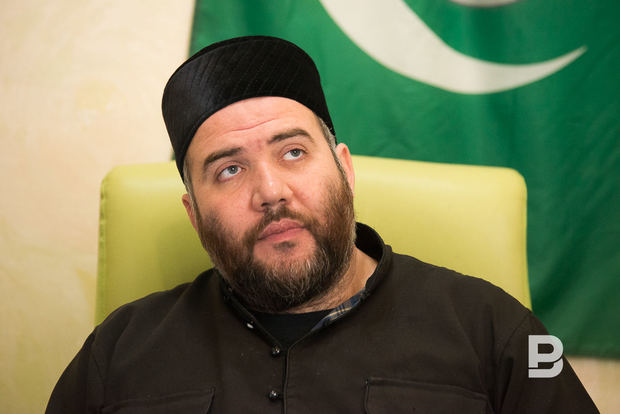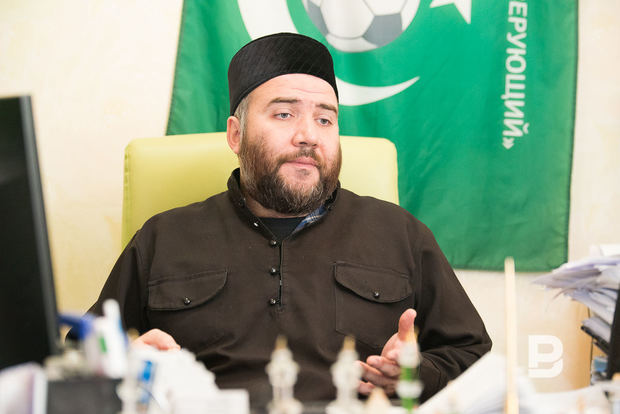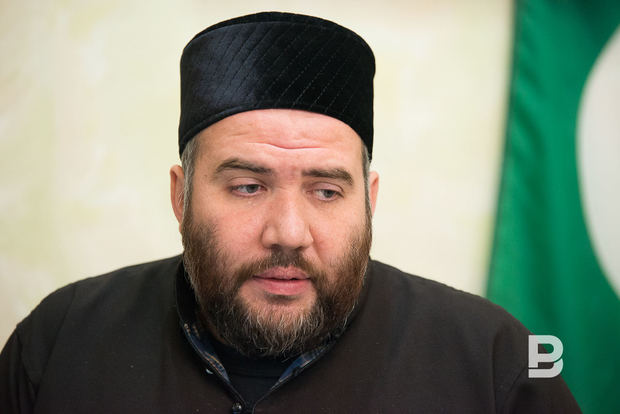Zakabannya Mosque’s Imam: Hazrat Iskhak knew many people – Kadyrov, Maskhadov, Dudaev…’
Realnoe Vremya’s exclusive interview with famous imam Seidjagfar Lutfullin. Part 2
Realnoe Vremya is publishing the second part of the interview with Zakabannaya Mosque's Imam Seidjagfar Lutfullin. It should be reminded the first part of the talk was dedicated to his scandalous statements about a singer dancing near the White Mosque, gay propaganda and disputable initiatives of the Muslim Spirituality Directorate of Tatarstan. Today the Muslim cleric tells about grandiose projects of his mahallah, his famous father Iskhak Lutfullin who was one of the originators of Tatarstan's sovereignty.
'What should I do with this sheep? Should I go outside and hand this meat?'
Hazrat Seidjagfar, you work for the public community. And Zakabannaya Mosque is famous for its social work. I have knew recently you are going to build a huge freezer for stage of meat here. And meat will be distributed among the needy. What storage is it?
We have already paid for it. Now we are buying the fridge to fulfil our projects. Meat that will be kept in the fridge is going to be given to other mosques for Iftar during Ramadan for their social canteens and to those who work with orphanages, schools and kindergartens. Much meat is brought for Sacrifice Feast. Last year we were given 1,5 tonnes. We don't manage to dress and distribute it. Meat is perishable food. Now we can not only keep and distribute calmly but also produce tins that we are going to send to different places, including prisons. It is a regional project that will help to accomplish many social plans. Sponsors have already given 500,000 rubles. We have bought the fridge. I hope we will finish everything during this month.
By the way, you will be able to make a payment from your phone. A big project Zurkurban Kazan is going to open where you can automatically send money to. Your money will be used for sacrifice of an animal, the meat will find its addressee: kids who became orphans, madrasas, social canteens, the poor and needy. We have a special page. We will open a group on Vkontakte.
What a social canteen do you have?
Now it is under repair. The mosque was returned by religious people in 1990. A madrasa opened in 1991. All the needy could come and eat. People used to enter some places, asked for food. They were told to go to Zakabannaya Mosque to eat. It all began at that moment. The first Higher Madrasa named after the Millennium of Adoption of Islam opened here. Pupils sacrificed animals (they learnt). Meat used to remain. It was salted and used as food. There was self-sufficiency. A necessity for opening a separate social canteen appeared in 2007-2008. At that moment I became imam-khatib when the previous imam passed away. You probably remember that then Islam was associated with Wahhabism, terrorism. Such a situation needed to be changed. The first step I made was to open a social canteen and work with kids who became orphans. In the whole Muslim world, in the West, it is a norm. For us, it doesn't seem to be a common practice. For example, a prisoner was released. Where will this person go? While he was in prison, his relatives managed to sell his flat and left him without a place to stay. He comes here and says: 'Hazrat, I need money or I will commit a crime'. And I have seen this person for the first time. I don't know whether he will spend the money on food. He will maybe buy alcohol, drugs. And we feed him. We also give packed lunches to lone mothers.

A big project Zurkurban Kazan is going to open where you can automatically send money to. Your money will be used for scarification of an animal, the meat will find its addressee: young orphanages, madrasas, social canteen, the poor and needy.
We don't have money to help everybody. There is one kind of voluntary charity. Two days ago we got products from Saby District on the initiative of the imam-mukhtasib of the region Hazrat Ainur who studied in our madrasa. People collect vegetables, fruits, berries every year. Somebody prepares varenye. Then they deliver it here. Muslims must give one part of their harvest (1/10) to the poor and needy. When a son is born, it is desirable to slaughter two rams – it is Sunnah. So we praise the Most High with slaughter. And the meat is distributed. People bring it to me. I am Tatar from Penza Oblast. I don't eat mutton. I prefer horse meat. What should I do with this sheep? Should I go outside and hand this meat? This is why I opened an infrastructure to sell all sacrifices, including food. For example, Nefis Cosmetics gives soaps and detergents. So our workers can use and eat it. We also bring kids who became orphans. Ramadan Tent appeared under the aegis of the social canteen. The Tank College provided us with military tents. We put them in front of the mosque – one for men, the other one is for women. Now we have one big tent. We prepared pilaf – it is the cheapest and best plate. 500 people can be fed with one ram and one bag of rice. We started with small things and gradually developed. People who decided to improve the canteen were found, so that not only the poor but also the rich would be able to eat there. So it was a self-financing. Anyone eats here. their payment is a payment for some poor person's lunch.
How much is one lunch?
The first, second plates and kompot are 130 rubles. Another problem is that a healthy food is needed. Constant fat food is harmful for health. It was almost impossible to find normal Soviet borsch or shchi. And it must be halal. We also organise different events and meetings in this canteen.
Kadyrov and Maskhadov's acquaintance
Your last father Iskhak Lutfullin was a famous religious cleric. Was he really a militant? How did he become hazrat?
He was Qoran-khafiz's son. Grandad Khamatgata consciously died even aged 98. During the tough communist years, he hosted people even if he was blind. He was shell-shocked after the war. Now Hazrat Iskhak's cousin serves there. As for my father, he left home at 14 with 40 rubles in his pocket. He graduated from the Military Tank College and Engineering College. He graduated from two higher military academies. He was a career officer, served in Germany, then he worked in Baku. He decided to end his military service in 1998 and went to study to Galiya madrasa in Ufa where Talgat Tadjuddin taught. In 1990, our family moved to Kazan. We came to this mosque. The Voluntary Society for Cooperation with the Army, Aviation, and Fleet was situated there at that time. A lieutenant-colonel worked downstairs. Hazrat Iskhak talked to him and asked to give that mosque to religious people. The lieutenant-colonel replied: 'Over my dead body'.
Hazrat Iskhak was educated person. He did everything according to the law. He gathered a mahallah from local people, registered it and talked to the local administration.

We printed a book about Hazrat Iskhak. Vasilya Rakhimova – a journalist and writer – collected information about him. A two-year madrasah opened after the 'conquest' of the mosque. Hazrat Gabdulkhak Samatov from Chistopol was invited for that purpose. Hazrat Iskhak talked to Talgat Tadjuddin and asked to transfer Samitov to Kazan. He came with his pupils and started to work here. When the mosque opened, Hazrat Iskhak gave his personal savings, which were equal to a three-room flat, to the mosque. So he showed he did not start the work with empty-handed and that he made his contribution. We, imams, should give an example with actions, not just words.
The main duty of religious clerics is to direct people towards the Most High. It is our road. When cheap politics starts, I am not going to take part in it. Religion doesn't have any national excellence. Quran says that there is no preference for Arabs over non-Arabs. There is no such thing as 'Arab Islam' or 'Tatar Islam'. There is Islam and national traditions we follow.
First camps started to appear here. Lessons for elderly women took place till night: people came after their work in factories and studied. It was an information hunger.
The last Hazrat Iskhak was not only religious but also a cultural and national activist. He was a praesidium member of the Tatarstan Community Centre. He actively participated in the restoration of sovereignty, creation of the national flag. He also put the half-moon to the Syuyumbike Tower. He worked with Farid Mukhametshin very closely, who is the chairman of the State Council today, and Fausiya Bairamova. Nationalists need a good leader, so they won't become radical. Hazrat Iskhak did it well. When he left them, you know what happened then: radicalisation. Navalny started to visit the building of the centre. All in all, they were divested of the building. After Hazrat Iskhak's death, I headed their arades several times. When people started to say 'Tatarstan is for Tatars', I thought it was wrong and that I could not be there.

The main duty of religious clerics is to direct people towards the Most High. It is our road. When cheap politics starts, I am not going to take part in it. Religion doesn't have any national excellence. Quran says that there is no preference for Arabs over non-Arabs. There is no such thing as 'Arabic Islam' or 'Tatar Islam'. There is Islam and national traditions we follow. If these traditional are correct, they comply with Sunnah, we restore them ourselves, jealously follow them.
Is it true that your father served in Angola and Mozambique? Did he really know Igor Sechin?
Who is Sechin?
He is a state worker, top manager of Rosneft, Putin's supporter.
It is possible. Hazrat Iskhak knew many people – Kadyrov, Maskhadov, Dudaev. He studied with them in the military academy. He was an activist, many people knew him. To tell the truth, I did not know what he did in detail because he was a member of the Audit Commission of the Spirituality Directorate. His professional nuances were not made public. It was forbidden for us. He was not a talkative person. He was a career officer who headed an ammunition warehouse. After his service, he was not allowed to visit the Hajj during 5 years. These professional skills enabled him to use them in his work in the directorate. Hazrat Iskhak was the organiser of a single directorate of Tatarstan. On a plenary session at Mardjani Mosque, he stood up and offered two religious organisations to resign. The union is his merit. The opening of the first higher Muslim madrasa is his merit. People started to get here professional Islamic education. Then they were sent abroad and were freed from military service. Many graduates are muftis and leading imams today.

Hazrat Iskhak was the organiser of a single directorate of Tatarstan. On a plenary session at Mardjani Mosque, he stood up and offered two religious organisations to resign. The union is his merit.
Was he really Valiulla Yakupov's mentor?
Hazrat Iskhak met with Valiulla Yakupov, his name was Vener at that time. And Hazrat Valiulla said to him: 'You opened a madrasa. Only people from villages study there. You need to educate urban residents and fight with crime.' Hazrat Iskhak replied: 'You will do it'. Then Valiulla Yakupov opened Muhammadia Madrasah at Apanaev Mosque. Valiulla also reproached that newspapers and magazines need to be issued, not these books about salah for elderly women. Hazrat Iskhak told: 'You will issue them. And I will help you.' Initially, Hazrat Valiulla printed books here too.